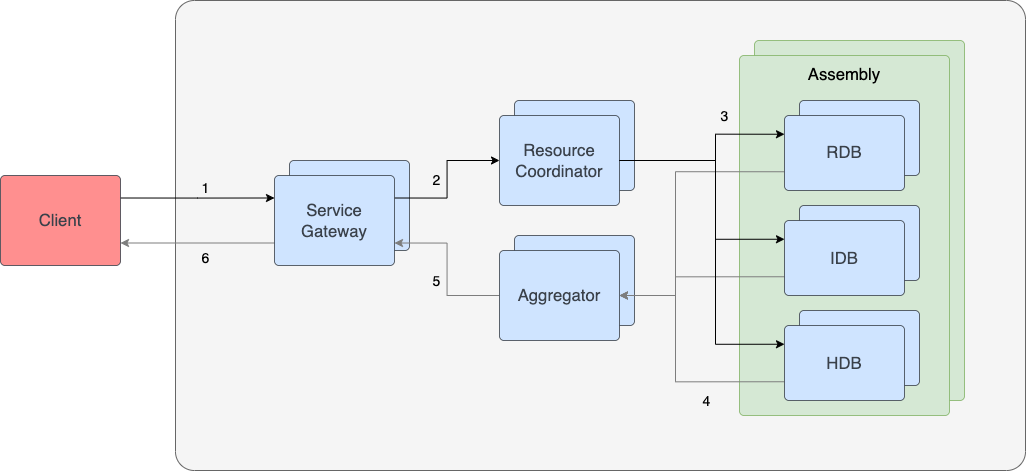Routing configuration
Query routing is managed by two primary components, the Service Gateway, and the Resource Coordinator. Queries are broken into partials and distributed across query instances and collected into a final result in the Aggregator

Unless otherwise specified, the arrows in the diagram represent asynchronous q IPC communication between processes. Query flow is as follows.
| arrow | description |
|---|---|
1 |
Client makes API request to a Service Gateway replica. This can be sync or asynchronous. |
2 |
The Service Gateway forwards the request to the Resource Coordinator. |
3 |
The Resource Coordinator sends partial requests to each DAP relevant to the query based on purview. |
4 |
DAPs forward their responses to a single Aggregator for aggregation. |
5 |
The Aggregator sends the response to the same Service Gateway the client connected to. |
6 |
The Service Gateway sends response back to client. |
These components route queries across one or more assemblies and are installed as part of a base deployment. These components are generally configured using using environment variables or a values file if using a Kubernetes based deployment. In both environment, environment variables can be used to change configuration.
Environment Variables
Configuration can be supplied to the Service Gateway or the Resource Coordinator using environment variables. Environment variables are configured differently depending on the method of deployment. In all cases, the variables are always string values.
In Docker, environment variables are supplied using under an environment key for the target service as a list of key-value pairs.
services:
sg:
environment:
- KXI_NAME=sg
In a Kubernetes deployment, environment variables are passed to compnents using a values file. For the Service Gateway, these values are supplied under an sg-gateway key. For the Resource Coordinator, these are supplied under a resource-coordaintor key.
kdb Insights Enterprise
When running in an enterprise deployment, values are nested under either a service-gateway or qe-gateway key in the values file. See enterprise deployment configuration for more details.
service-gateway:
sg-gateway:
env:
KXI_SG_TIMEOUT: "50000"
resource-coordinator:
env:
KXI_SG_TIMEOUT: "50000"
Service Gateway
| name | description |
|---|---|
GATEWAY_QIPC_PORT |
Gateway port for QIPC traffic. |
GATEWAY_HTTP_PORT |
Gateway port for HTTP traffic. |
SM_CONTAINER_NAMES |
Comma separated list of SM container names the GW should connect to. You should not need to touch this unless you've customized your SM container names. (default:"sm"). |
DISCOVERY_PROXY |
Discovery proxy address (not required if not using discovery). |
KXI_SG_RC_ADDR |
host:port of RC process to connect to. |
KXI_SG_TIMEOUT |
Default request timeout in milliseconds (default: 60000). |
KXI_SG_TIMEOUT_MARGIN |
Controls the amount of time to wait for the RC to complete a request in milliseconds. The service gateway waits this many milliseconds after a request has timeout out for the RC to issue a timeout request. (default: 30000) |
KXI_RC_SERVICE_NAME |
The key that the gateway looks for to find Resource Coordinators within the discovery registry. (default: KXI-SG-RC). |
KXI_SG_RC_LABEL_SELECTOR |
Allow the gateway to find Resource Coordinators by label selector. Required for Kubernetes-based discovery. |
KXI_SG_DA_LABEL_SELECTOR |
Allow the gateway to find DAPs pods by label selector. |
KXI_SG_SM_LABEL_SELECTOR |
Allow the gateway to find Storage Manager pods by label selector. |
KXI_AUTH_DISABLED |
Set KXI_AUTH_DISABLED=0 to use the gateway with Keycloak. |
KXI_OIDC_JSON_PATH |
OIDC JSON used for mapping Keycloak authentication endpoints. |
Resource Coordinator
| name | description |
|---|---|
KXI_NAME |
Process name. |
KXI_PORT |
Port. |
KXI_SG_RC_ADDR |
host:port of RC process to connect to. |
KXI_GC_FREQ |
Frequency in milliseconds to run garbage collect in a timer (default: 600000, set to 0 to disable). |
KXI_SG_TIMEOUT |
Default request timeout in milliseconds (default: 60000). |
KXI_SG_DISC |
Multi-RC discovery mode. |
KXI_SG_CONN_TIMEOUT |
Timeout on connection open. |
KXI_SG_MAX_RETRY |
Maximum number of retries the RC is willing to do for retry-able errors. |
KXI_ALLOWED_SBX_APIS |
Comma-delimited list of sandbox APIs to allow in non-sandbox RCs (e.g. .kxi.sql,.kxi.qsql). |
KXI_SG_REQ_DEL_FREQ |
Time in milliseconds to run the request table delete routine (default: 10000). |
KXI_SG_QUEUE_DEL_FREQ |
Time in milliseconds to run the queue table delete routine (default: 10000). |
KXI_SAPI_HB_FREQ |
Time in milliseconds to run the heartbeat to connected processes (default: 30000). |
KXI_SAPI_HB_TOL |
Number of heartbeat intervals a process can miss before being disconnected (default: 2). |
KXI_SG_MULTI_RC_TO_MAX_WAIT |
On a timeout of a multi-RC request, number of 10 second iterations to wait for timeout details from all RCs (default: 1). |
KXI_ENABLE_FLUSH |
Set to true to enable async flush on messages from RC to DA/Agg and from Agg to GW (default false). |